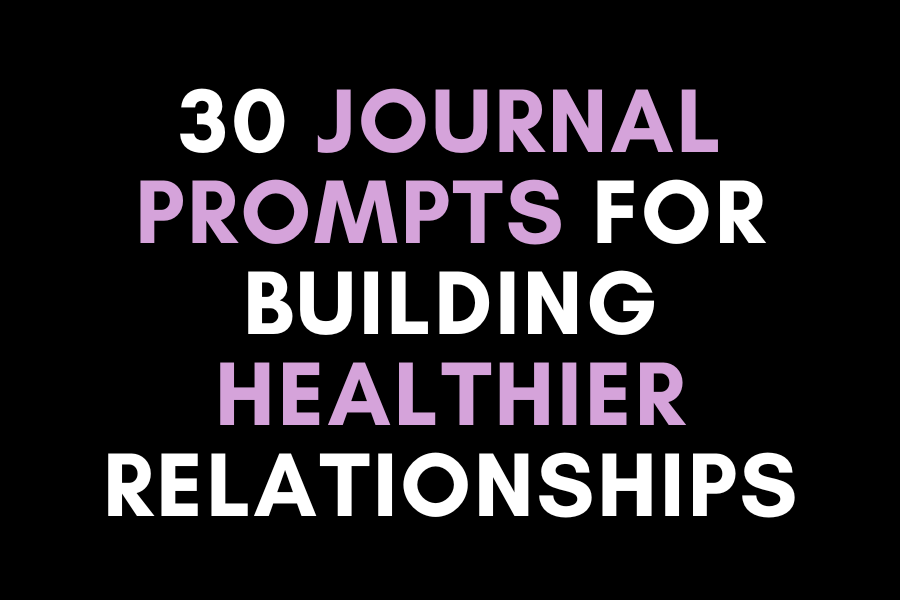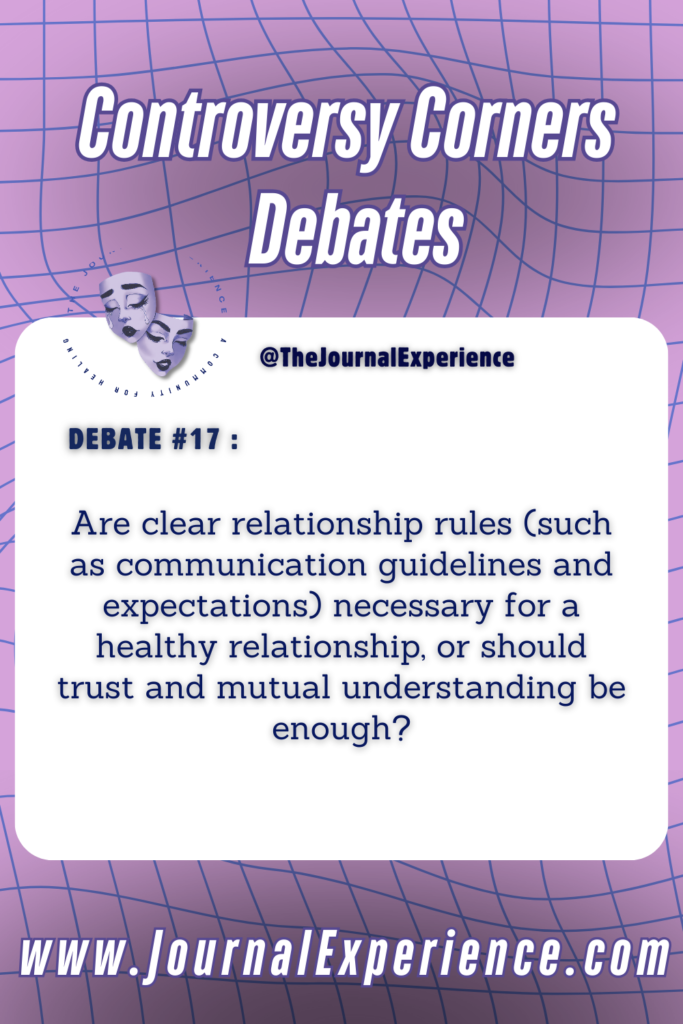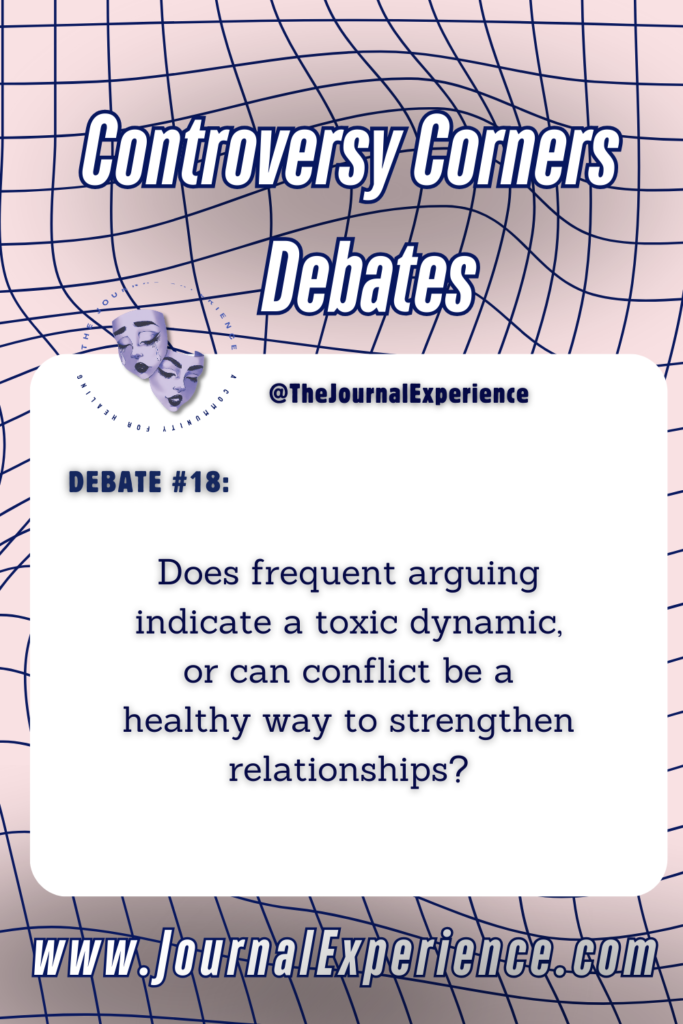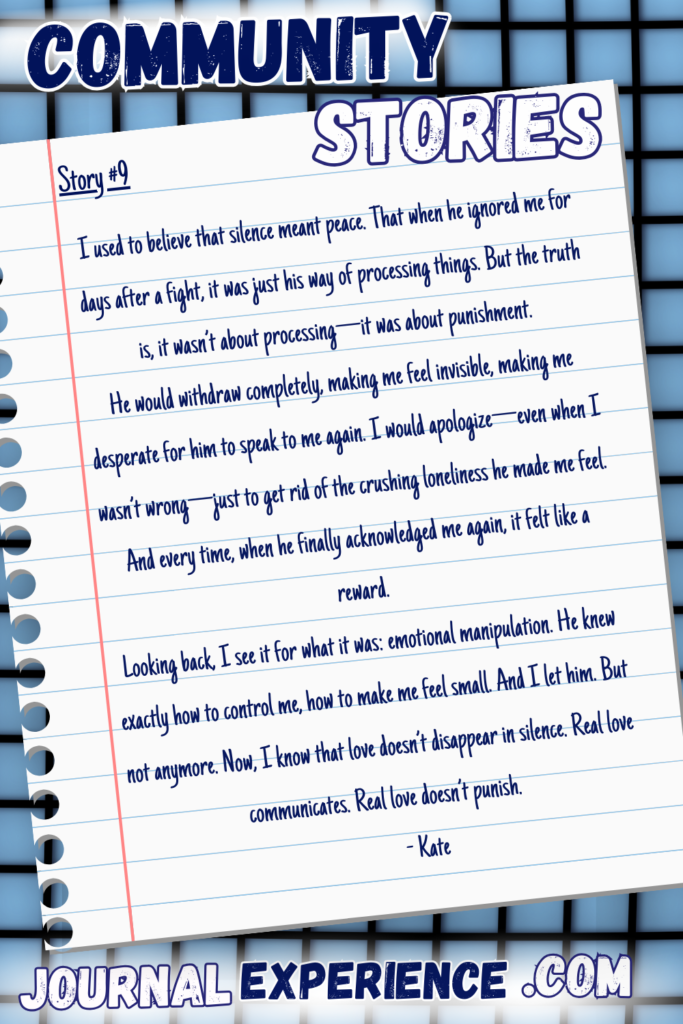Healthy relationships are built on emotional intelligence, open communication, and self-awareness. Whether it’s a romantic relationship, a close friendship, or a family bond, cultivating healthy connections requires effort, reflection, and the ability to navigate challenges with empathy and understanding.

Many people struggle with maintaining balanced relationships due to unresolved personal patterns, past experiences, or difficulty expressing their emotions effectively.
Journaling is a powerful tool for deepening self-awareness and improving relationships. Through writing, you can identify recurring patterns, gain clarity on your emotional needs, and develop a healthier approach to communication and conflict resolution. Journaling also helps foster emotional intimacy by allowing you to articulate feelings, set boundaries, and express appreciation for the important people in your life.
These 30 journal prompts are designed to help you build stronger, healthier relationships by encouraging self-reflection, enhancing emotional intelligence, and strengthening the bonds you share with others.
Journal Prompts for Healthy Relationships
Understanding Relationship Patterns and Personal Attachment Style
Our past experiences play a significant role in shaping how we interact in relationships. Recognizing personal patterns and understanding your attachment style can help you build stronger, more secure connections. Many relationship challenges stem from unexamined behaviors and emotional reactions that have developed over time. Journaling about these topics can help bring awareness to patterns that may be limiting your ability to form healthy bonds and provide insight into areas that need healing or improvement.
Journal Prompts:
- What are some recurring themes in your past relationships, and how have they influenced your approach to love and connection?
- How would you describe your attachment style, and how does it impact your relationships?
- Reflect on a past relationship that significantly shaped your views on love and trust. What lessons did you learn from it?
- What behaviors or emotional responses do you tend to repeat in relationships? Are they serving you well?
- How do you typically react to conflict, and where do those reactions stem from?
- What are your core relationship needs, and how do you communicate them to your partner or loved ones?
Reflection Exercise:
Write a letter to yourself about what kind of relationship patterns you want to break and what healthy behaviors you would like to adopt moving forward.

Communication and Conflict Resolution Prompts
Effective communication is the foundation of any successful relationship. The ability to express yourself clearly, listen actively, and manage emotions during disagreements strengthens trust and connection. Many conflicts arise due to miscommunication, unmet expectations, or emotional reactivity. Journaling can help you recognize areas where you can improve your communication style and develop healthier conflict-resolution skills.
Journal Prompts:
- How do you usually communicate your feelings, and how can you improve your approach?
- What are your biggest communication challenges in relationships?
- How do you handle conflict—do you avoid it, confront it directly, or become defensive?
- Write about a recent disagreement. How was it resolved, and what could have been done differently?
- How do you feel when someone actively listens to you? How can you become a better listener?
- What are three ways you can express your emotions without escalating a conflict?
Communication Tip:
Practice using “I” statements instead of “you” statements to express your feelings in a way that fosters understanding rather than blame.
Deepening Emotional Intimacy with Your Partner
Emotional intimacy is about feeling truly seen, heard, and valued in a relationship. It requires vulnerability, appreciation, and genuine connection. Journaling about your emotions and desires can help you nurture closeness with your partner and strengthen your bond. Writing allows you to process feelings, express gratitude, and develop deeper emotional awareness.
Journal Prompts:
- What are three things you appreciate most about your partner or a close loved one?
- How do you express love and affection? Is it the same way you like to receive love?
- What actions make you feel most emotionally connected to your partner?
- Write about a meaningful moment you shared with your partner and why it was special.
- How can you create more opportunities for deep conversations and quality time?
- What are ways you can show appreciation and support in your relationship?
Gratitude Exercise:
Write a heartfelt note of appreciation to your partner, even if you don’t share it with them. Reflecting on what you cherish can help strengthen your emotional bond.

Setting Boundaries and Creating Mutual Respect
Boundaries are essential for maintaining healthy relationships. They ensure mutual respect, prevent resentment, and create a balanced dynamic where both partners feel valued and secure. Journaling about your boundaries can help you clarify what you need from your relationships and how to communicate those needs effectively.
Journal Prompts:
- What personal boundaries are most important to you in a relationship?
- Have you ever felt uncomfortable in a relationship because your boundaries weren’t respected? How did you handle it?
- How do you communicate your boundaries to others? Is there room for improvement?
- What are signs that a relationship is not respecting your needs or values?
- How can you establish healthier boundaries in your personal and romantic relationships?
- What does mutual respect look like to you, and how can you cultivate it in your relationships?
Boundary-Setting Exercise:
List three personal boundaries that you will prioritize moving forward and how you plan to uphold them.
Self-Reflection for Personal Growth in Relationships
Healthy relationships start with self-awareness. Understanding your strengths, emotional triggers, and areas for improvement allows you to show up as your best self in relationships. Self-reflection helps you recognize how you contribute to your connections and empowers you to foster healthier, more fulfilling bonds.
Journal Prompts:
- What personal strengths do you bring to a relationship?
- What are your biggest emotional triggers, and how do they affect your relationships?
- How do you handle feedback or constructive criticism in relationships?
- What steps can you take to become a more supportive and understanding partner or friend?
- What limiting beliefs do you have about relationships, and how can you work on changing them?
- How has journaling helped you gain insight into your relationships so far?
Personal Growth Exercise:
Write a commitment statement outlining how you plan to foster healthier relationships moving forward.
Overview
Journaling is a transformative tool that allows you to navigate relationships with more clarity, confidence, and emotional intelligence. By reflecting on past experiences, improving communication, and setting boundaries, you create the foundation for healthier and more fulfilling connections. Relationships require continuous effort, and self-awareness is key to fostering love, trust, and mutual respect.

Healthy relationships don’t just happen; they are nurtured through mindful interactions, thoughtful communication, and intentional personal growth. By continuously working on yourself, you enhance not only your relationships with others but also your relationship with yourself. The journey to stronger connections starts with self-reflection and a commitment to personal development.
If you’re ready to dive deeper into self-reflection and relationship growth, join The Journal Experience—a supportive space filled with resources, journaling prompts, and expert insights. Subscribe today and take your first step toward building stronger, healthier relationships!